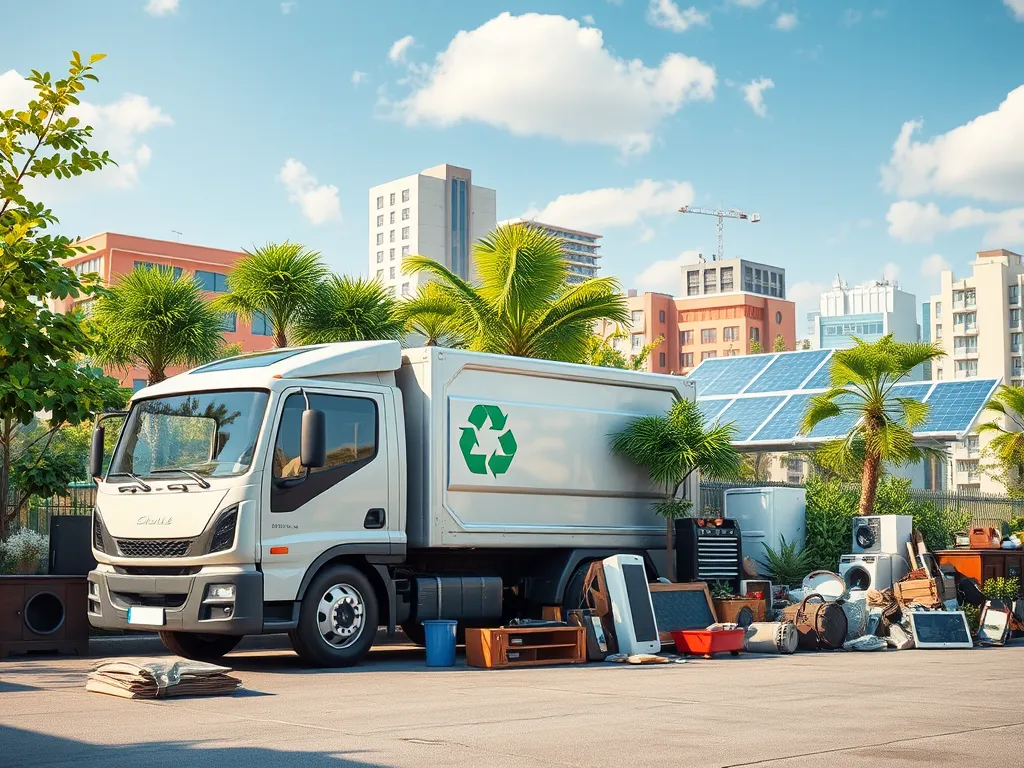Exploring Trends in the Junk Removal Industry for 2023

Trends in Junk Removal Industry
The junk removal industry is constantly evolving, shaped by changing consumer preferences, increasing environmental awareness, and technological advancements. Trends in junk removal industry have seen a significant shift towards eco-friendly practices, emphasizing the importance of sustainable disposal methods and recycling initiatives. As more consumers demand responsible disposal of their unwanted items, junk removal companies are adapting to these preferences by incorporating green practices into their operations, leading to a transformation of traditional business models.
In recent years, the integration of technology has also emerged as one of the most noteworthy trends in junk removal industry. Companies are leveraging mobile applications that allow users to book services easily, track their waste, and receive instant quotes. Additionally, advances in junk sorting technology have improved operational efficiency, making it easier for companies to separate items for recycling and disposal. This technological innovation not only enhances productivity but also contributes to better environmental outcomes by increasing recycling rates and reducing landfill waste.
Market growth in the junk removal industry is another critical trend that cannot be overlooked. As urbanization continues to rise, there has been an increased demand for junk removal services in emerging markets. Entrepreneurs are taking advantage of this growth through franchising opportunities, allowing for businesses to expand their reach quickly. Furthermore, partnerships with local governments and organizations are becoming common, facilitating community cleanup efforts and waste management initiatives that benefit both parties.
Customer expectations have shifted dramatically as well, prompting a re-evaluation of service offerings within the junk removal industry. On-demand services have become increasingly popular, driven by the convenience that consumers desire. Companies are now providing customized solutions tailored to individual client needs, ensuring a more personalized experience. Transparent pricing models have also gained traction, allowing customers to understand the cost structure clearly and fostering trust in service providers.
Lastly, regulatory changes are shaping the landscape of junk removal. New waste disposal regulations are being implemented, which affect how junk removal companies conduct their business. These changes demand compliance with stringent guidelines, emphasizing the safe handling and disposal of hazardous materials. As such, businesses are adapting their practices to meet these regulations and remain competitive in an industry where sustainability and safety are paramount.
Eco-Friendly Junk Removal
Eco-friendly junk removal practices are gaining immense popularity as consumers become increasingly aware of their environmental footprint. Sustainable disposal methods, such as donating usable items to charities or recycling materials, are now standard practices among reputable junk removal companies. By prioritizing eco-friendly options, these businesses not only satisfy customer demand but also play a crucial role in reducing waste sent to landfills.
Recycling initiatives are at the forefront of eco-friendly junk removal. Companies are actively seeking to recycle as much waste as possible, partnering with local recycling facilities to process items efficiently. This approach not only helps divert waste from landfills but also contributes to the circular economy by ensuring that materials are reused and repurposed.
As the industry evolves, understanding the Top 10 Trends to Look for in The Waste Management Industry is essential for sustainable growth.
Green certifications for junk removal companies have started to emerge, providing consumers with a way to identify businesses that adhere to environmentally friendly practices. These certifications ensure that companies follow specific standards regarding waste disposal, recycling rates, and sustainability efforts, making it easier for consumers to choose eco-conscious service providers.
The demand for eco-friendly options is driving changes in consumer behavior. More customers are seeking out junk removal services that prioritize sustainability, which has led companies to enhance their green offerings. This consumer shift is not just a trend; it represents a new expectation for businesses to operate responsibly and consider the environmental impact of their services.
Technology Integration in Junk Removal
The integration of technology in the junk removal industry has revolutionized how companies operate and interact with customers. The use of mobile applications for booking services is becoming increasingly common, allowing consumers to schedule pickups with just a few clicks. These apps often provide real-time tracking and instant pricing quotes, enhancing the customer experience and streamlining operations for junk removal providers.
Innovations in junk sorting technology are also transforming the way companies handle waste. Advanced sorting systems utilize automated processes and machine learning algorithms to identify and separate recyclable materials from general waste. This technological advancement increases efficiency and accuracy in waste separation, ensuring that more items are diverted from landfills and sent to recycling facilities.
Drones and robotics are making their way into the junk removal industry for more efficient hauling processes. These technologies can help lift and transport larger items, improving safety and reducing the physical strain on workers. As these innovations continue to advance, we can expect to see even more significant changes in how junk is collected and removed.
Data analytics is being harnessed to enhance operational efficiency in junk removal businesses. By analyzing customer behavior, service patterns, and waste disposal metrics, companies can optimize their routes, improve scheduling, and make better decisions about resource allocation. This analysis not only streamlines operations but also minimizes environmental impact by reducing fuel consumption and improving service delivery.
Market Growth and Opportunities
The junk removal industry is witnessing significant market growth, particularly in emerging markets. Rapid urbanization and population growth lead to increased waste generation, creating a higher demand for junk removal services. Businesses that can capitalize on this trend by establishing a presence in these markets are likely to see considerable growth opportunities in the coming years.
Franchising trends are reshaping the junk removal landscape, allowing entrepreneurs to tap into established brand recognition while minimizing startup risks. Many successful junk removal companies are expanding their reach through franchising, enabling quick market penetration and access to a larger customer base. This trend is encouraging entrepreneurs to invest in the industry and contribute to its overall growth.
Partnerships with local governments are becoming increasingly essential for junk removal companies. These collaborations can take various forms, such as community cleanup events, educational initiatives on waste management, and local waste reduction programs. By working together, junk removal companies and local authorities can enhance waste management efforts and promote environmentally responsible behaviors among residents.
The impact of urbanization on junk removal cannot be overstated. As cities grow and develop, the volume of waste generated continues to rise, necessitating effective junk removal solutions. Companies that can adapt to this changing urban landscape and establish themselves as trusted providers will undoubtedly find success in an increasingly competitive market.
Customer Expectations and Service Trends
Today’s consumers expect convenience and flexibility when it comes to junk removal services. On-demand junk removal services allow customers to request pickups at their convenience, often within hours of booking. This trend is indicative of a broader shift towards instant gratification and has pushed companies to prioritize responsiveness and accessibility.
Customized solutions for clients are in high demand, as companies recognize that a one-size-fits-all approach is no longer effective. Businesses are developing tailored services that cater to individual customer needs, whether it’s specialized removals for specific types of junk or flexible pickup schedules. This approach enhances the customer experience and fosters loyalty among clients.
Transparent pricing models are becoming a standard practice in the junk removal industry. Clients appreciate clarity regarding the cost of services, leading companies to offer upfront pricing and detailed breakdowns of what is included in the service. This transparency builds trust between service providers and customers, resulting in increased satisfaction and repeat business.
Customer service enhancements are crucial for junk removal companies looking to differentiate themselves in a crowded market. Companies are investing in training for their staff to ensure that they provide exceptional service from the first point of contact to the finalized pickup. This focus on customer service helps build relationships with clients and encourages positive word-of-mouth referrals.
Regulatory Changes Affecting Junk Removal
New waste disposal regulations are emerging worldwide, aiming to promote sustainable waste management practices and reduce environmental impact. These regulations often dictate how junk can be disposed of, mandating that businesses implement specific protocols for handling different types of waste, especially hazardous materials.
The impact of legislation on industry practices is significant, as companies must adapt to comply with new requirements. This can involve investing in training, updating operational procedures, and implementing new technologies to ensure compliance, affecting overall business processes and costs.
Compliance requirements for junk removal businesses are becoming increasingly stringent. Companies are now expected to follow detailed guidelines regarding waste management, necessitating thorough record-keeping and reporting to regulatory bodies. Businesses that struggle to comply may face penalties or even lose their licenses to operate, making compliance a critical issue in the industry.
Trends in hazardous waste removal are evolving as regulations become more robust. Companies are adapting by investing in specialized training and equipment to handle hazardous materials safely. This trend is crucial for protecting both the environment and public health, ensuring that junk removal services meet the highest standards of safety and sustainability.
